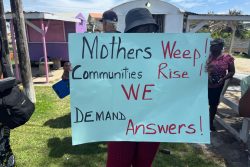Within the last three weeks, there have been reports of women being assaulted, both verbally and physically, while participating in politics. These events are of particular relevance as just last month 28 female politicians from various nations signed a declaration that their countries would ensure the safe participation of politics for women.
The Joint Declaration On Advancing Women’s Political Participation said in part, “We call upon all states, including those emerging from conflict or undergoing political transitions, to eliminate all discriminatory barriers faced by women, particularly marginalized women, and we encourage all states to take proactive measures to address the factors preventing women from participating in politics such as violence, poverty, lack of access to quality education and health care, the double burden of paid and unpaid work, and to actively promote women’s political participation including through affirmative measures, as appropriate.”
 It is no small thing for a woman to find a way to contribute politically. There are so many obstacles to overcome just in everyday life alone that the idea of adding political participation can be simply overwhelming.
It is no small thing for a woman to find a way to contribute politically. There are so many obstacles to overcome just in everyday life alone that the idea of adding political participation can be simply overwhelming.
Additionally, in a poll conducted in Guyana in 2003 of 446 women, “A significant portion held the view that ‘politics is too dirty and ugly.’” The last couple of weeks have proven these women to be right in their assessment. Why is it that women must fight so hard to exercise a right that is already constitutionally theirs?
Millions of women around the world have the right to vote and to hold political office, but the existence of that right alone does not mean they can always act on it without ramifications, both political and social.
That domestic violence continues to steal the lives of women and children is a human travesty. That women must also face violence as they exercise their constitutional right to participate in the political arena is barefaced gender discrimination.
Worse still yet is the fact that there seems to be very few who are willing to raise their voices in protest over the fact that there are men intimidating these women who were brave enough to put aside the stereotypical feminine roles concerning politics and women.
One cannot help but wonder whether there would not have been an uproar of epic proportions if Khemraj Ramjattan, David Granger or Donald Ramotar were faced with the same type of verbal and physical abuse as Valerie Garrido-Lowe. So why was there no uproar for Garrido-Lowe?
Would anyone have dared to even attempt such a stunt with Ramjattan, Granger or Ramotar? Is it because Garrido-Lowe is a female that these men felt such behaviour would be tolerated by society? Did they know there would be no uproar because she is “just a woman”? All of these questions should and must be asked and answered.
In a nutshell, certain men intimidated Guyana’s only 2011 female presidential candidate into quitting her run for that office. This was a shameful act. Even more shameful is the fact that the person who chased her off is campaigning for an entirely different political party, which shows this was not about wanting to lead the United Force again, but about getting rid of this particular female presidential candidate.
Even if the other United Force faction felt it somehow had the legal right to occupy Unity House, there was no legal right to verbally and physically abuse a political leader. This is a perfect example of how little respect women are afforded in society. Even first ladies and female presidential candidates are not spared the contempt.
There have been other alleged assaults against women on the campaign trail as well. Let me make this very clear, even if there is an argument and things get heated, there is no justification for violence against women. Women are not animals to be beaten into submission to the male will. Women have wills of their own that deserve and require equal space.
Where is the outcry against this violence? Why are the president and his party not denouncing the violence?
Guyana has what is called a “critical mass” of women in legislative positions. This means that close to 30 per cent of parliament is female. This is an international goal that was set just a few short years ago and has already been accomplished in Guyana. The intention of this target was to have more female decision-makers to whom women could voice their issues.
The female politicians of this nation should be looking out for the women of Guyana. Yet very little of that is being done. More often than not, these female leaders are whipped into submission and curtsy to the agendas of their male colleagues for the sake of the party. In the process, women’s issues get lost again.
For example, on this issue of women being subjected to violence while participating in politics, who among the female politicians has championed their cause? Who has stood up for them and demanded justice? Who has demanded that those involved be removed from their positions immediately? There may be one or two, but Guyana’s women legislators should have come together en masse to stand up for their gender’s right to participate in politics.
Mark my words, dear female politicians, unless these men are held accountable, the violence will continue – and next time it could be you. Ask yourselves how these acts of violence will affect the female voters and those who want to participate in politics. If I am wrong and Guyana’s female leaders are not the “yes” women of their male counterparts, then prove me wrong and I will happily eat my words.
I want to eat my words. I want to see the fight in their eyes, but more often than not what I see is acquiescence and compliance to the very same patriarchal system that forces them to have to fight for every inch of their constitutional right. Heaven help our daughters if this is not righted.









